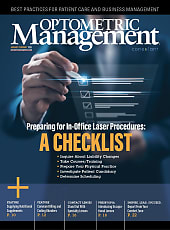I HAS ALWAYS BEEN AMUSED that I was chosen to write the “Business of Contact Lenses” column for this publication. There has been plenty to offer since 2008, but my practice management skills are always a work in progress. In the exam room, I think I am one of the best; in my private office, I consider myself average.
Don’t get me wrong, management of my practice is not neglected and, in fact, is managed very efficiently. All of the practice metrics are as on the mark as they can be. I don’t think I would have survived the pandemic as a downtown metropolitan practice had I not been very careful about that.

Richard Bach’s book Illusions: The Adventures of a Reluctant Messiah always seems to open to the page needed in the moment. One time it opened upon this bit of wisdom: “You always teach best what you most need to learn.” Maybe that is why this column has been going so long.
Irv Borish, OD, known as the Father of Modern Optometry, taught me something that was the most difficult lesson to learn: “Everything that happens in your practice is your fault.” Period.
One of the areas where most of us fall short is in using our staff fully and effectively. But there are 2 caveats. First, check with your state laws regarding what a staff member can and cannot do under your delegation authority. For example, in Texas, what staff can do is fairly limited while in other states, they are allowed to perform much more.
Second, it is not a good idea to abdicate your authority and responsibility to your staff. Can anyone really call him- or herself a specialist if the staff prescribes all the specialty lenses from beginning to end?
Rather, what is being advised is to use your staff to advocate for the contact lens process and help gather data. For instance, staff can do dry eye questionnaires or ask patients about their contact lens usage or interest. And they should gather data independently.
The practitioner should never have to ask a staff member to perform a topography, a pachymetry, or an axial length. Your staff should know what tests are indicated for a particular patient. Technically, the practitioner has to order every test, but the staff should anticipate which ones will be wanted. The front desk staff should also help to market the contact lens and dry eye services in the practice.
Practitioners need to be involved and lead the way in teaching staff how to use their skills—because everything that happens in your practice is your fault, and I am at fault for not utilizing my staff enough.



